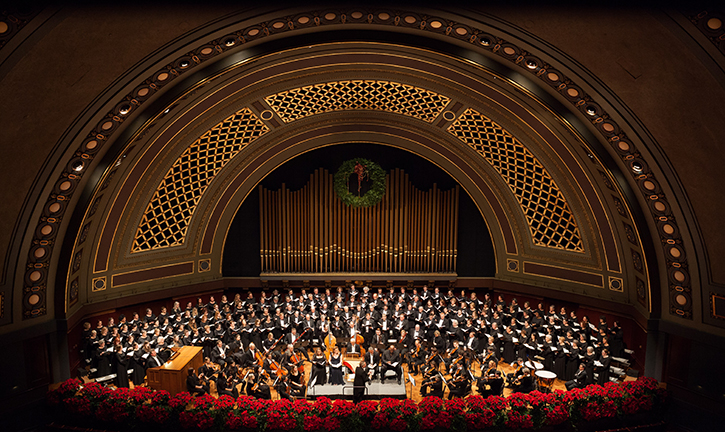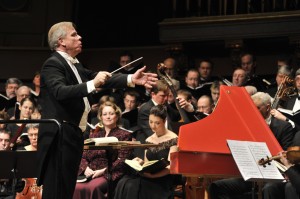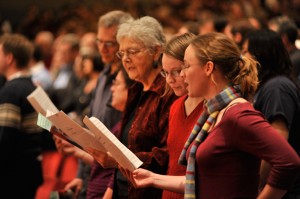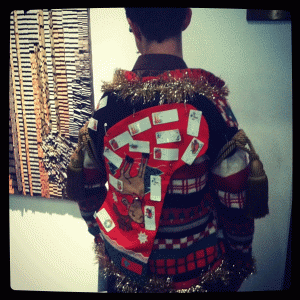Meet the Soloists: ‘Messiah’ 2021/22

Nearly 300 years after its composition, Handel’s Messiah continues to fill Hill Auditorium with its ravishing beauty, brought to life by friends and colleagues from the community. On December 4 & 5, 2021, music director Scott Hanoian conducts the UMS Choral Union and the Ann Arbor Symphony Orchestra in the return of this beloved annual holiday tradition.
Meet this year’s soloists and guest artists: Joélle Harvey, Meg Bragle, Nicholas Phan, and Dashon Burton.
 Joélle Harvey, soprano
Joélle Harvey, soprano
A native of Bolivar, New York, soprano Joélle Harvey has established herself as a noted interpreter of a broad range of repertoire, anchored by Handel, Mozart, and new music. She specializes as a soloist for orchestral and choral works, appearing with the Cleveland Orchestra, Handel and Haydn Society in Boston, Mostly Mozart Festival in New York City, and others.
Harvey received bachelor’s and master’s degrees in vocal performance from the University of Cincinnati College-Conservatory of Music and was a member of Glimmerglass Opera’s Young American Artists Program. Her engagements during the 2021-2022 season include debuts with Opernhaus Zürich, the Chicago Symphony Orchestra, and UMS.
 Meg Bragle, mezzo-soprano
Meg Bragle, mezzo-soprano
Widely praised for her musical intelligence and “expressive virtuosity” (San Francisco Chronicle), Meg Bragle has earned an international reputation as one of today’s most gifted mezzo-sopranos. A frequent featured soloist with Sir John Eliot Gardiner and the English Baroque Soloists, she has made four recordings with the group.
Bragle has appeared with many symphony orchestras in the U.S. and Canada including the Houston, National, Seattle, Detroit, Atlanta Cincinnati, Indianapolis, Milwaukee, Pacific, and Colorado Symphonies; the National Arts Center Orchestra and the Calgary Philharmonic in music ranging from Bach and Vivaldi to Mozart, Beethoven, and Mahler.
Her opera roles include Idamante in Idomeneo, Dorabella in Cosi fan tutte, Dido and the Sorceress in Purcell’s Dido and Aeneas, Dardano in Handel’s Amadigi, Amastre in Handel’s Serse, Speranza in Monteverdi’s L’Orfeo, Ippolita in Cavalli’s Elena, and Elpina in Vivaldi’s La Fida Ninfa.
Learn more: “5 Questions with Meg Bragle”
 Nicholas Phan, tenor
Nicholas Phan, tenor
Described by the Boston Globe as “one of the world’s most remarkable singers,” American tenor Nicholas Phan is increasingly recognized as an artist of distinction. Praised for his keen intelligence, captivating stage presence, and natural musicianship, he performs regularly with the world’s leading orchestras and opera companies. Also an avid recitalist, in 2010 he co-founded the Collaborative Arts Institute of Chicago (CAIC) to promote art song and vocal chamber music, where he serves as artistic director.
A celebrated recording artist, Phan’s most recent album, Clairières, a recording of songs by Lili and Nadia Boulanger, was nominated for the 2020 Grammy Award for Best Classical Solo Vocal Album. His album, Gods and Monsters, was nominated for the same award in 2017. He remains the first and only singer of Asian descent to be nominated in the history of the category, which has been awarded by the Recording Academy since 1959.
A graduate of the University of Michigan, Phan is the 2012 recipient of the Paul C Boylan Distinguished Alumni Award and the 2018 Christopher Kendall Award. He also studied at the Manhattan School of Music and the Aspen Music Festival and School, and is an alumnus of the Houston Grand Opera Studio.
Read San Francisco Classical Voice’s 2017 profile: “Getting to Know Recitalist Nicholas Phan”
 Dashon Burton, bass-baritone
Dashon Burton, bass-baritone
Bass-baritone Dashon Burton has established a vibrant career, appearing regularly throughout the United States and Europe in key elements of his repertoire — Bach’s St. John and St. Matthew Passions and the B minor Mass, Mendelssohn’s Elijah, Beethoven 9, the Brahms Requiem, Handel’s Messiah, and Mozart’s Requiem.
Throughout his 2021/22 season, he makes several notable orchestral debuts with the Chicago Symphony, the Los Angeles Philharmonic, the Pittsburgh Symphony, and the Seattle Symphony.
Operatic engagements in recent seasons have included Salome at the Salzburg Festival led by Franz Welser-Möst and Peter Sellars’s production of Claude Vivier’s Kopernikus, un ritual de mort at Paris’ Théâtre de la Ville as well as Sarastro in Die Zauberflöte in Dijon and Paris and Jupiter in Rameau’s Castor et Pollux with Les Talens Lyriques.
Dashon Burton won his second Grammy in March of 2021, for Best Classical Solo Vocal Album for Dame Ethyl Smyth’s The Prison with The Experiential Orchestra. An original member of the groundbreaking vocal ensemble, Roomful of Teeth, he won his first Grammy for their recording of Caroline Shaw’s Pulitzer-Prizewinning Partita for 8 Voices.
How to Get Ready for Handel’s Messiah
Handel’s Messiah performances are an annual tradition at UMS.
In 2015, we followed conductor Scott Hanoian into a rehearsal with the UMS Choral Union.
Updated 6/2/2017
Poinsettias in Our Offices

Poinsettias in our office following our annual Handel’s Messiah performances. Did you attend? Don’t forget to share your thoughts.
A Video History of Handel’s Messiah
In this interview, archivist Richard LeSueur shares the history of this Ann Arbor holiday tradition:
UMS first presented Handel’s Messiah in December of 1879, and we’re kicking off the holiday season with this year’s performances on December 3 and 4, 2016.
Last updated 4/29/2016.
Making cookies in ugly holiday sweaters
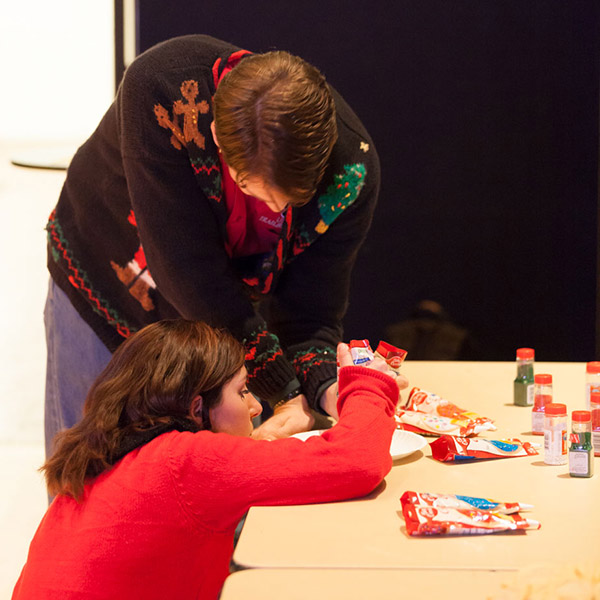
Photo by Mark Gjukich Photography.
Our 4th Annual Ugly Sweater Party in conjunction with Handel’s Messiah performances will take place Saturday, December 6, 2014.
Behind the Scenes with Soprano Janai Brugger
This post is a part of a series of playlists curated by artists, UMS Staff, and community. Check out more music here.
Soprano Janai Brugger performs at our annual Handel’s Messiah on December 6-7, 2014. We had the chance to chat with Janai about her time in Ann Arbor and about what she’s been listening to lately. Check out her selections in the playlist below.
UMS: We know that you’re a University of Michigan alum. Can you talk a little about your time in Ann Arbor, and what you’re looking forward to in coming back?
Janai Brugger: It’s been five years since I graduated from the University of Michigan, so I am truly excited to return to Ann Arbor to perform at my alma mater! I have so many wonderful memories of my time at U-M, that I’m not sure exactly where to start or which ones to pick.
One of my fondest memories was attending my Studio Class with [U-M Professor] Shirley Verrett. Listening to my colleagues sing through new repertoire, seeing the process each week, critiquing, growing together was so much fun. Ms. Verrett was very adamant in asking us to always say something that we liked about a performance before listing the things we wished we could’ve done better. That was an important lesson and reminder for me during that time, and it continues to be something I remember today when I receive criticism. the class was always a supportive environment, tons of laughter, great music, and we heard amazing stories from Ms. Verrett. Our studio class was like a family, and we all looked forward to gathering together and singing for one another.
Another memory from my time at the University is meeting my husband! Javier Orman was a U-M Violin Master’s student, and we were introduced through a mutual friend. We had our first date a Pierpont Commons and talked for hours over hot chocolate [laughs]. So, in many ways Ann Arbor is very special for that reason, because I met my partner and best friend there. He’s such a wonderful person and a very talented musician and artist, whom I respect and admire more and more each day.
Janai’s Playlist:
Mozart’s The Magic Flute
I am studying the role of Pamina for my Covent Garden debut next year.
German Lieder sung by Barbara Bonney
I am singing a few song recital concerts with tons of German Lieder, and Barbara Bonney is one of my favorite interpreters of these songs
The Best of Ella Fitzgerald
I love listening to Ella sing, especially when I need a little escape from the classical world [laughs].
Motown Classics
I grew up listening to Motown artists and it’s just such great feel good music, it gets my energy going and makes me happy!
The Monster Mash hit album for kids
I’m putting this playlist together around Halloween, and my son is a year-and-a-half, so we are listening to lots of fun Halloween songs for kids. He loves it!
Selected Tracks on our Spotify Playlist:
What did you think about this playlist? Share your thoughts or song suggestions in the comments below.
Behind the Scenes with countertenor David Trudgen
This post is a part of a series of playlists curated by artists, UMS Staff, and community. Check out more music here.
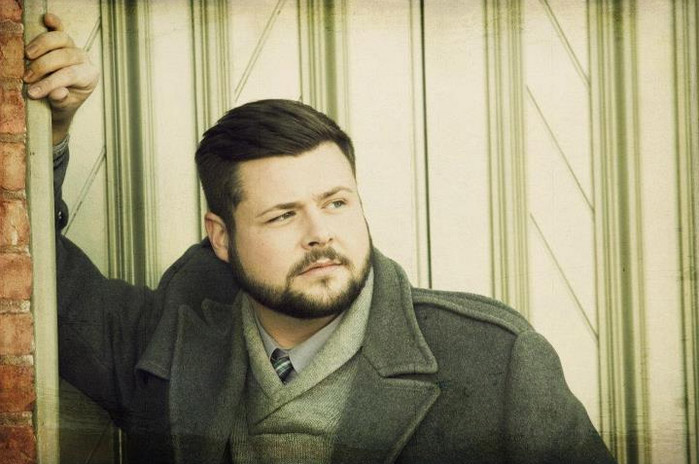
Photo: David Trudgen. Courtesy of the artist.
Countertenor David Trudgen performs in Handel’s Messiah on December 7 and 8, 2013. We had the chance to chat with David about his time in Ann Arbor and about what he’s been listening to lately. Check out his selections in the playlist below.
UMS: We know that you’re a University of Michigan alum. Can you talk a little about your time in Ann Arbor, and what you’re looking forward to in coming back?
David Trudgen: Looking back at my 2 years at Michigan brings up so many fantastic memories, but also reminds me of the opportunities I came to through U-M, like the chances to sing at Carnegie Hall in NYC and at the Kennedy Center in DC. And of course, I loved attending football games at the Big House.
For having as much fun as I had, I also worked very hard. I spent most of my free time at the School of Music, Theatre & Dance, where I was constantly learning new music, and trying to absorb all I could, because I knew this school could give me the tools that I needed to succeed as a musician. I wouldn’t have gotten to where I am without the advice of George Shirley, my voice professor, Martin Katz, my vocal coach, and all of the professors at the U-M School of Music.
I am so excited that UMS has asked me come back to perform as part of this year’s Handel’s Messiah. I remember attending Messiah at Hill Auditorium while I was in school and dreaming about singing this piece on the stage of this amazing building. Who knew that dream would come true? I also wanted to say another special thanks to Dr. Jerry Blackstone and UMS for the invitation. I feel honored to come back to sing at my Alma mater!
David’s Playlist:
Four Sea Interludes from Peter Grimes by Benjamin Britten
Symphony No. 3 by Henryk Górecki with Dawn Upshaw, Soprano
Chasing Pavements by Adele
Make You Feel My Love by Adele
“As with rosy steps the morn” from Theodora by Handel with Lorraine Hunt Lieberson
Piano Concerto No. 1 in B-flat minor, Op. 23 by Pyotr Ilyich Tchaikovsky
Burn by Ellie Goulding
Love Game by Lady GaGa
You and I Both by Jason Mraz
“He has come…. Do not utter a word Anatol” from Vanessa by Barber with Renee Fleming
Let me touch you for a while by Alison Krauss
Brasileiras No. 5 Aria Cantilena by Heitor Villa-Lobos with Renee Fleming
Bohemian Rhapsody by Queen
Sleeping Sickness featuring Gordon Downie by City and Colour
Sex on Fire by Kings of Leon
Hey Mama by the Black Eyed Peas
What Now by Rihanna
Selected tracks on our Spotify playlist:
What did you think about this playlist? Share your thoughts or song suggestions in the comments below.
‘Tis the Season: Your Messiah Memories
An annual tradition since 1879, UMS’s presentation of Handel’s Messiah has become a “signature” Ann Arbor experience. We’re so grateful for the participation of the community in this event year-after-year, and we hope you’ll share with us some of your favorite Messiah memories: how many years you’ve attended, why you look forward to Messiah every year, what makes this event special to you.
Share your memories with us in the comments below, or on Facebook, Twitter, or Instagram with hashtag #umslobby. Photos welcome!
Over the year’s we’ve also collected video memories. Here are a few audience reactions to last year’s performances.
These two are getting a bit of off-camera direction…
Graduated U-M in 1978, and attended ever since…
Snow storm strikes in the middle of Messiah…
Whole family in the video booth…
And here are some of our favorites from throughout our history.
Jerry Blackstone, director of UMS Chormal Union and long-time Messiah conductor, on forgetting his jacket on the day of a Messiah performance.
Father Timothy Dombrowski, choral union member for over forty years, remembers “The Bat out of Hill.”
Megan Sajewski, U-M alumni and resident of Martha Cook dormitory, talks about co-chairing the annual Martha Cook Messiah Dinner.
Last updated 4/29/2016.
Handel’s Messiah: A history in photos, programs, and video
This post is a collaboration between UMS interns Meaghan McLaughlin and Kayla Silverstein.
UMS has a history of 135 years of hosting unique performers and bringing talents all over the world to perform on Ann Arbor stages. A massive factor in the founding of UMS and a piece of its history still today is the annual presentation of Handel’s Messiah. While history has changed the presentation of this monumental piece, the tradition is one that UMS patrons can look forward to every year. But when did it all begin?
Handel’s Messiah is a UMS tradition; the work has been performed in its entirety every year since 1941. Records indicate that the first time the UMS Choral Union presented this holiday piece was with a small choir, a mere fraction of the Choral Union today. Upon their first meeting, the choir director at the time, Dr. Henry Simmons Frieze, chose a piece out of Handel’s Messiah. The group quickly decided to devote their time and energy into mastering a few select portions of this work, meeting every Tuesday to rehearse. Their first concert was small but intimate, performed in the M. E. Church on December 16, 1879.
Photos from the UMS Archives.
This small-scale performance of Handel’s Messiah is rare today. The piece is most commonly heard with a large choir backed by an orchestra. The pioneers of the UMS Choral Union performed solely with a double string quartet and two pianos. Not quite what Handel had in mind, but I think he would appreciate the effort of these trend-setting singers.
The concert included ten works in addition to the two chosen choruses of Messiah: “For unto us a Child is Born” and “Lift up Your Head, O Ye Gates.” With so much attention and time devoted to learning Messiah, it fast became a tradition of the ensemble to study and perform bits of the work every December.
Fortunately for audiences today, the performance and tradition of Handel’s Messiah has grown and evolved with the times. The Choral Union today consists of 175 accomplished voices, a much fuller sound that gives Messiah that extra bit of power. Full orchestral accompaniment is now standard with the yearly performances as well as Hill Auditorium as the venue – an acoustically-blessed building that produces the rounded sound that brings the work to life.
Want more Messiah history? Check out the program for the original Messiah performance or watch our video history of Handel’s Messiah.
Share your favorite Messiah memories in the comments below.
Kayla Silverstein is a fourth-year undergraduate student at the University of Michigan, pursuing a dual degree in English and Creative Writing with a minor in French. She works as an intern in both the marketing and programming departments at UMS. In her free time, she enjoys running, drinking obscene amounts of coffee, and writing short fiction.
Meaghan McLaughlin is a former UMS Intern and a 2013 U-M graduate
From UMS Student Committee’s 2nd annual ugly sweater party
Our UMS Student Committee selected this sweater as their favorite sweater from this year’s Arts & Eats event accompanying Handel’s Messiah performances last weekend.
The pointsettias have arrived for Handel’s Messiah!

The poinsettias have arrived! Decorating Hill for this weekend’s Messiah performances.
[VIDEO] Messiah Memories Bloopers
UMS first presented Handel’s Messiah in December of 1879. Over several weeks, we released a series of Messiah Memories webisodes from everyone involved over the years. We couldn’t resist releasing these staff bloopers.
Previously:
Episode 1: Jerry Blackstone, long-time Messiah conductor, forgets his jacket on the day of the performance.
Episode 2: Father Timothy Dombrowski, choral union member for over forty years, remembers “The Bat out of Hill.”
Episode 3: Megan Sajewski, resident of Martha Cook dormitory, talks about co-chairing the annual Martha Cook Messiah Dinner.
Episode 4: Meg Bragle (mezzo-soprano) and Mary Wilson (soprano), Messiah soloists and good friends, talk about the fun of coming back to Ann Arbor to perform in Messiah.
[VIDEO] Messiah Memories: Soloists Meg Bragle and Mary Wilson
UMS first presented Handel’s Messiah in December of 1879. Over several weeks, we released a series of Messiah Memories webisodes from everyone involved over the years.
In this episode, Meg Bragle (mezzo-soprano) and Mary Wilson (soprano), Messiah soloists and good friends, talk about the fun of coming back to Ann Arbor to perform in Messiah:
Previously:
Episode 1: Jerry Blackstone, long-time Messiah conductor, forgets his jacket on the day of the performance.
Episode 2: Father Timothy Dombrowski, choral union member for over forty years, remembers “The Bat out of Hill.”
Episode 3: Megan Sajewski, resident of Martha Cook dormitory, talks about co-chairing the annual Martha Cook Messiah Dinner.
[VIDEO] Messiah Memories: Megan Sajewski, resident of Martha Cook dormitory
UMS first presented Handel’s Messiah in December of 1879. In this third episode, Megan Sajewski, resident of Martha Cook dormitory, talks about co-chairing the annual Martha Cook Messiah Dinner.
Comment below with your own Messiah Memories!
Previously:
Episode 1: Jerry Blackstone, long-time Messiah conductor, forgets his jacket on the day of the performance.
Episode 2: Father Timothy Dombrowski and “The Bat out of Hill”
[VIDEO] Messiah Memories: Father Timothy Dombrowski and “The Bat out of Hill”
UMS first presented Handel’s Messiah in December of 1879. In this second webisode of our Messiah Memories series, Father Timothy Dombrowski, choral union member for over forty years, remembers “The Bat out of Hill.”
Comment below with your own Messiah Memories!
Previously: Episode 1: Jerry Blackstone, long-time Messiah conductor, forgets his jacket on the day of the performance.
[VIDEO] Messiah Memories: Jerry Blackstone, Conductor
UMS first presented Handel’s Messiah in December of 1879. We’re kicking off a webisode series of Messiah Memories from everyone involved over the years. In this episode, Jerry Blackstone, long-time Messiah conductor, forgets his jacket on the day of the performance.
Comment below with your own Messiah Memories!


